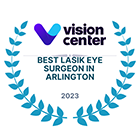
Optometrists and ophthalmologists both play an important role in maintaining your eye health, but that role differs slightly due to their levels of training and areas of expertise. You’ll want to make time to see one or the other depending on what sort of eye care treatment you’re seeking out.
What Does An Optometrist Do?
An optometrist is a doctor of optometry, and is a primary care eye care provider. Optometrists are healthcare professionals who provide primary vision care ranging from sight testing and correction to the diagnosis, treatment, and management of vision changes. These eye care professionals handle your regular optometry appointments. Dr. Monica Bishop, our optometrist can diagnose diabetic & hypertensive retinopathy, glaucoma, & cataracts as well as diagnose & treat eye infections and inflammations, optic nerve disorders, remove foreign bodies from the eyes, treat ocular surface disease, comanage laser corrective procedures & cataract post ops with the ophthalmologists, & provide myopia management for children.
You’ll want to make an appointment to see your optometrist regularly so you can accurately track changes in your vision and eye health. It is important for your optometrist to have a good history regarding your systemic health and medications you are taking that could affect their visual and ocular health. Dr. Bishop is knowledgeable in many health conditions that can alter eye health, such as diabetes, hypertension, high cholesterol, and autoimmune conditions to name a few.
What Does An Ophthalmologist Do?
An ophthalmologist diagnoses and treats all eye diseases, performs eye surgery and prescribes and fits eyeglasses and contact lenses to correct vision problems. Unlike an optometrist, those practicing ophthalmology also are seen by those seeking advanced eye care treatment, such as surgical procedures.
Do I Need to See An Optometrist or An Ophthalmologist?
Whether you see an optometrist or an ophthalmologist in a given visit will depend on the specific reason you’re making your appointment. If you’re just looking for your routine eye exam, an optometrist is the way to go. However, if you’re experiencing severe symptoms or preparing for eye surgery, then make an appointment with an ophthalmologist.
Like we said earlier, regular visits with an optometrist are recommended to maintain your eye & vision health. However, when you’re in need of a specialist or need care byond what your regular optometrists can provide, then that’s when an ophthalmologist is needed. Because of these different areas and levels of care, it’s recommended both types of eye care professionals become part of your eye and vision health team and that you find an eye care center that provides you with both.











.png)

